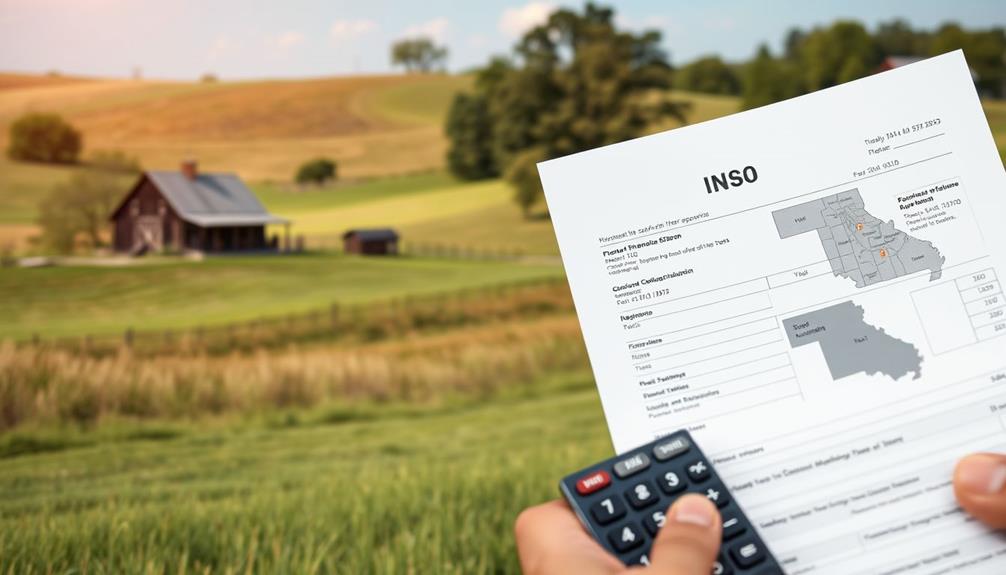In Wyoming, you do not have to worry about paying state income tax on your IRA withdrawals, making it a desirable choice for retirees. Both traditional and Roth IRAs are not subject to state taxes, although you will still need to consider federal income taxes based on your tax bracket. Furthermore, Wyoming offers low property tax rates and exempts sales tax on essential items, which helps support retirees’ financial stability. This tax-friendly environment can assist you in effectively managing your retirement funds. If you are interested in learning more about federal tax obligations and strategic planning to maximize your retirement income, there is plenty more information to uncover.
Key Takeaways
- Wyoming does not impose a state income tax on IRA withdrawals, allowing retirees to keep more of their funds.
- Federal taxes may apply to traditional IRA withdrawals based on the retiree's tax bracket.
- Roth IRA withdrawals can be tax-free if certain conditions are met, providing potential tax benefits.
- Early withdrawals from IRAs before age 59½ incur a 10% penalty, with specific exceptions available.
- Required Minimum Distributions (RMDs) begin at age 73 and are subject to federal income tax; failure to withdraw incurs a 25% penalty.
Wyoming's Tax Environment for Retirees

Wyoming consistently ranks as one of the most tax-friendly states for retirees, largely due to its lack of a state income tax. This means your retirement income isn't taxable at the state level, offering you significant financial relief. You won't have to worry about state income tax eating into your IRA withdrawals, which lets you stretch your savings further.
Additionally, Social Security benefits and pension income are also exempt from state taxes in Wyoming. This exemption allows you to retain a larger portion of your income compared to many other states.
The average effective property tax rate is only 0.60%, one of the lowest in the U.S., which further reduces your overall tax burden.
With a low sales tax rate averaging around 5.36%, you can enjoy a minimal tax burden overall.
When you consider these benefits alongside Wyoming's lower cost of living compared to the national average, it becomes clear how feasible it's to live comfortably on your retirement income, including those IRA withdrawals.
Federal Taxation on IRA Withdrawals

When you withdraw from a Traditional IRA, you'll face federal income tax based on your tax bracket for that year.
If you take out funds from a Roth IRA, you might enjoy tax-free withdrawals, as long as you meet certain conditions.
Be mindful that early withdrawals before age 59½ often come with a hefty 10% penalty, so planning ahead is essential.
Federal Tax Rates
Understanding federal tax rates is essential for managing IRA withdrawals effectively. When you take Traditional IRA distributions, they're taxed as ordinary income, which means they can greatly affect your federal income tax.
For 2023, the federal income tax rates range from 10% to 37%, depending on your total income level and filing status. This means that if you withdraw funds from your Traditional IRA, you might increase your taxable income, potentially pushing you into a higher tax bracket and increasing the overall tax you owe.
If you're 59½ or older, you can make penalty-free withdrawals from your IRA, but keep in mind that the regular income tax still applies to those Traditional IRA distributions.
Additionally, the IRS requires you to start taking required minimum distributions (RMDs) from Traditional IRAs at age 73, which will also be subject to federal income tax.
It's vital to plan your withdrawals wisely to minimize your tax impact and avoid unexpected tax liabilities. By understanding how these rates apply, you can make more informed decisions about your IRA withdrawals and overall financial strategy.
Withdrawal Penalties Explained
Withdrawing funds from your IRA can come with significant penalties if you're not careful. When you take withdrawals from retirement accounts before age 59½, you typically face a 10% early withdrawal penalty on top of regular income tax. This means you'll owe tax on retirement at your ordinary income rate, which could add up quickly.
However, there are some exceptions to this rule, like first-time home purchases or qualified education expenses, which can help you avoid that penalty.
For Roth IRAs, the rules differ. If your account's been open for at least five years and you're over 59½, you can withdraw funds tax-free. But if you're accessing contributions before that threshold, you won't face penalties.
It's also essential to remember that Required Minimum Distributions (RMDs) kick in at age 73 for traditional IRAs. Failing to take your RMDs can lead to a hefty 25% penalty on the amount you should have withdrawn.
Understanding these federal taxation nuances will safeguard you from unnecessary penalties and help you manage your retirement funds more effectively.
State Tax Implications in Wyoming

Retirees in Wyoming can enjoy a unique advantage when it comes to IRA withdrawals, as the state boasts no income tax. This means that all forms of retirement income, including IRA distributions, are tax-free at the state level. You won't have to worry about state taxes eating into your hard-earned savings, allowing for greater financial flexibility.
However, keep in mind that federal taxes may still apply to your IRA withdrawals. It's important to plan accordingly for your overall tax liability. Additionally, Wyoming's low property tax rate of 0.60% and a local sales tax averaging 5.36% further enhance the financial landscape for retirees relying on IRA distributions.
Here's a quick overview of Wyoming's tax landscape for retirees:
| Tax Type | Rate |
|---|---|
| State Income Tax | 0% |
| Property Tax | 0.60% |
| Local Sales Tax | 5.36% |
| Tax on IRA Income | 0% |
Social Security Benefits and Taxation

Social Security benefits in Wyoming offer a notable advantage, as they aren't taxed at the state level. This means that if you rely on social security retirement benefits, you can maximize your income without worrying about additional state tax deductions.
While it's important to remember that federal taxes may still apply to your benefits, Wyoming's lack of state income tax greatly enhances your financial situation.
Living in Wyoming can be quite manageable, especially since the cost of living is slightly lower than the national average. Many retirees find they can live comfortably on Social Security alone, thanks to the affordable living conditions in various areas.
If you're planning your retirement, it's wise to think about how retirement income is taxable at the federal level. Financial advisors in Wyoming can help you navigate these complexities and make certain you're making the most of your benefits.
They can guide you through potential federal tax implications, making sure you understand how to keep your retirement income intact. Overall, Wyoming's tax landscape is favorable for retirees looking to enjoy their Social Security benefits without the burden of state taxes.
Taxation of Other Retirement Income

Understanding the tax implications of various retirement income sources can greatly impact your financial planning. In Wyoming, you'll find that taxes on retirement income, such as pension payments and distributions from retirement plans, are non-existent at the state level. This means you won't pay any state taxes on your Social Security benefits or any 401(k) or IRA withdrawals.
Wyoming's lack of a state income tax provides significant financial relief for retirees like you. With all forms of retirement income exempt from state taxation, you'll be able to retain more of your hard-earned savings.
While federal taxes may still apply to your IRA withdrawals, the absence of state taxes means you can keep more of the money you need for your retirement expenses.
Additionally, local sales tax in Wyoming averages around 5.36%, but it doesn't apply to essential items such as groceries and prescription medications. This further enhances the tax-friendly environment for retirees.
Property Tax Overview in Wyoming

Property taxes in Wyoming are among the lowest in the nation, offering homeowners a notable financial advantage. With an average effective property tax rate of just 0.60% of assessed value, you'll find that your property tax bills are relatively manageable.
For example, homeowners typically pay about $600 in property taxes for every $100,000 of their home's value, leading to lower costs compared to national averages.
Here are three key points to evaluate about property taxes in Wyoming:
- State-wide Assessment: Property taxes are governed by a uniform state-wide assessment system, ensuring consistency across all counties.
- Median Home Value: With a median home value around $323,197, property tax bills remain lower than many other states, thanks to the favorable rates.
- Exemptions and Relief: Wyoming offers exemptions for retirement income and various tax relief programs for seniors and veterans, considerably reducing your property tax burden.
Sales Tax Considerations for Retirees

When you think about sales tax as a retiree in Wyoming, you'll find the local rate is relatively low, averaging 5.36%.
Plus, essential items like groceries and prescription drugs are exempt from sales tax, offering you some financial relief.
Understanding these aspects can help you better manage your budget during retirement.
Sales Tax Overview
Maneuvering sales tax can greatly impact your retirement budget, especially if you're pondering relocating to a state like Wyoming. Understanding the sales tax landscape can help you make informed financial decisions.
Here are three key points to ponder:
- Sales Tax Rates: Wyoming has a state sales tax rate of 4%, and with local taxes averaging around 1.36%, the total comes to about 5.36%. This rate is relatively low compared to many other states.
- Exemptions for Essentials: Essential items like groceries, prescription drugs, and medical equipment are exempt from sales tax in Wyoming. This provides significant financial relief, especially for retirees who rely on these necessities.
- Property Taxes: Wyoming boasts one of the lowest property tax rates in the U.S., with an average effective rate of just 0.60%. This means you can potentially save more on property taxes, further enhancing your overall financial stability.
Essential Exemptions Explained
Understanding sales tax exemptions is essential for retirees looking to maximize their financial resources. In Wyoming, you can breathe easier knowing there's no state sales tax on groceries, prescription drugs, and medical equipment. This relief is particularly beneficial if you're living on a fixed income.
The average local sales tax of 5.36% is relatively low, contributing to a lower overall tax burden for you.
With no state income tax, your IRA withdrawals won't face additional state taxation, giving you greater financial flexibility. This condition allows you to retain more of your retirement income, which is vital for budgeting your expenses.
Additionally, the effective property tax rate in Wyoming is a mere 0.60%, making it easier for you to maintain an affordable living environment.
Planning for Retirement Income Taxes

Planning for retirement income taxes is essential for maximizing your financial resources in retirement. In Wyoming, you can take advantage of the absence of state income tax, making IRA withdrawals tax-free at the state level.
However, it's vital to be aware of your federal tax obligations. Here are three key points to take into account as you plan for retirement income taxes:
- Understand Federal Tax Implications: While Wyoming doesn't tax retirement income, federal taxes may still apply to your IRA withdrawals. Familiarize yourself with the tax brackets and potential penalties.
- Evaluate Your Income Sources: Reflect on all forms of retirement income, including Social Security and pensions, and how they interact with your IRA distributions. This can help you strategize your withdrawals effectively.
- Monitor Your Overall Tax Burden: With Wyoming's low property tax rate of 0.60% and a sales tax rate of 5.36%, your overall tax burden remains low, enhancing your financial landscape during retirement.
Frequently Asked Questions
Does Wyoming Tax IRA Distributions?
No, Wyoming doesn't tax IRA distributions. You can withdraw funds without worrying about state income tax, allowing you to enjoy your retirement savings fully. It's a tax-friendly environment for your retirement income.
Do You Pay State Taxes on IRA Withdrawals?
You don't pay state taxes on IRA withdrawals in Wyoming, which means you can keep more of your hard-earned savings. Just remember, federal taxes still apply, so plan your withdrawals carefully to minimize liabilities.
Do States Tax IRA Income?
Yes, many states do tax IRA income, but the rates and rules vary. You'll want to check your state's regulations to understand how much you'll owe and plan your withdrawals accordingly for tax efficiency.
Do You Pay State Taxes on 401K Withdrawals?
Imagine a state where tax collectors sip tea, laughing at your 401(k) withdrawals. In reality, you won't pay state taxes on them. Enjoy those funds while planning for federal taxes, though—don't get too comfortable!
Conclusion
To summarize, understanding the tax implications of your IRA withdrawals in Wyoming can greatly impact your retirement planning. Did you know that Wyoming has no state income tax, making it a popular choice for retirees? This means you can enjoy your hard-earned savings without the burden of state taxes. By staying informed about your tax situation, you can maximize your retirement income and enjoy the benefits of living in a tax-friendly state like Wyoming.









